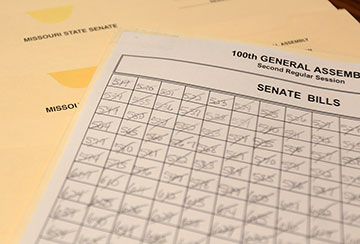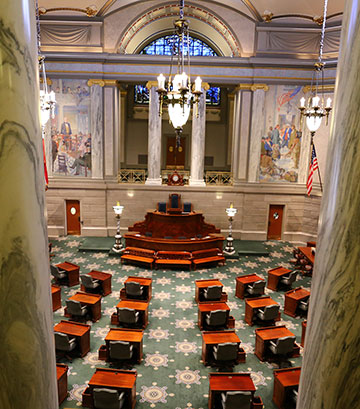Before almost any race or sporting event, participants are given fair warning that the time has come to perform. Runners are told to “Take your mark.” Automobile racers are commanded to “Start your engines.” Baseball players stand at attention for the National Anthem before being instructed to “Play ball!”
At the Missouri State Capitol, lawmakers are given their signal, as well. On the first day of business in December, members of the Missouri General Assembly are allowed to pre-file bills for the upcoming legislative session. A much-anticipated date on the Statehouse schedule, pre-filing allows lawmakers a jump start on the legislative process and offers Capitol observers a glimpse into the priorities and issues that will dominate the next few months.

“Pre-filing is our two-minute warning,” says Adriane Crouse, the secretary of the Missouri Senate. “The sudden influx of bills reminds us that crunch time is here and that the race to the legislative finish line is about to begin.”
It falls to Crouse and her staff of 17 to prepare bills for the start of the 2020 legislative session on Jan. 8. On that date, the title of every pre-filed bill will be read aloud in the Senate chamber. In the days that follow, each of these bills will be assigned to committees and the legislative process will begin in earnest.
Just two days into December, more than 250 bills and 24 Senate Joint Resolutions have been pre-filed and now appear on the Missouri Senate’s website. Decades ago, journalists and public policy advocates had to gather around the Senate mail room to see printed versions of proposed legislation. These days, all that information is posted online, adding transparency and convenience to the legislative process.
Proposed legislation is entered into the Senate bill hopper based on seniority. The longest-serving member of the Senate is granted the three lowest numbers, followed by the next-senior member, with majority party legislators taking a spot in line before minority party lawmakers with equal experience. Each legislator is assigned three bill numbers as the Senate secretary works through the stack of pre-filed bills. The cycle repeats until all bills are assigned numbers. Because Missouri’s legislature operates on two-year cycles, the numbering of bills for the Second Regular Session of the 100th General Assembly begins where the 2019 session left off, at Senate Bill 519.

Some of these bills are new for 2020. Others present proposals carried over from the 2019 legislative session. This year’s tally of pre-filed bills already outpaces the total number of measures introduced during December 2018, when 233 bills were pre-filed for the First Regular Session. Crouse says that’s to be expected given that every lawmaker in Missouri’s upper chamber has now served at least one year, and all have unfinished legislative priorities they hope to get across the finish line.
The list of pre-filed bills posted on the Senate website provides a glimpse of the legislative agenda for the 2020 session, which concludes on May 15. Criminal justice reforms, gun laws, sports and video gambling, education, health care and taxes are just some of the major topics addressed by the bills already submitted. Other proposed measures relate to arcane and specific areas of law that may not generate headlines, but are important to select groups of citizens.
Each year, far more bills enter the race than cross the finish line. Last year, 518 bills were introduced in the Senate. Just 41 of those were signed by the governor and became law. Of the successful measures, 32 were pre-filed before opening day. There’s no guarantee that a pre-filed bill has a better chance of passage than legislation introduced during session, but an early start does allow a proposal more time to work through the process. It remains to be seen how the 2020 legislative session will play out, but pre-filing sends an unmistakable signal throughout the Capitol that the game is on.
